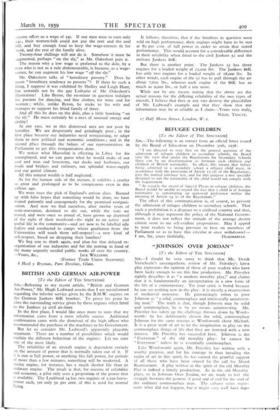"JOHNSON OVER JORDAN"
[To the Editor of THE SPECTATOR]
should be very sorry to think that Mr. Derek Verschoyle's unsympathetic review of Mr. Priestley's latest play represents the opinion of those of your readers who have been lucky enough to see this fine production. Mr. Priestley rightly describes it as "a modern morality play," and claims that it is fundamentally an interpretation in a new form of the life of a contemporary. Yet your critic is bored because he can see nothing new in the play : it is merely a resurrection of mediaeval nonsense. He patronisingly refers to poor Johnson as "a solid, commonplace and intrinsically uninterest- ing man." The truth is that, though Johnson may be solid and commonplace, he is by no means uninteresting. Mr. Priestley has taken up the challenge thrown down by Words- worth : he has deliberately chosen the solid, commonplace Johnson for the same reasons as Wordsworth chose Michael. It is a great work of art to let the imagination so play on the commonplace things of life that they are invested with a new interest. Mr. Priestley has succeeded here. Johnson is the " Everyman " of the old morality play : he cannot be "Everyman' unless he is essentially commonplace.
Like Wordsworth again, Mr. Priestley has written with a worthy purpose, and for his courage in thus invading the realm of art in this spirit, he has earned the grateful support of all those who have been stirred by the call for Moral Rearmament. A play written in the spirit of the old Morality Play is indeed a timely production. As in the old Morality plays, so in lohnson Over 7ordan, we are made to feel the struggle between the powers of good and of evil for the soul of the ordinary commonplace man. The cabaret scene repre- sents what did not happen, but it might very well have hap- pened. To say (as Mr. Verschoyle says) that Johnson is here "allowed to indulge to breaking point in the sensuality and extravagance which convention and lack of means had denied to him in life" is a totally inadequate explanation of the significance of this effective scene.
In the last scene, which Mr. Verschoyle rather bewilderingly describes as "the unhappiest of all," Mr. Priestley has magnificently and convincingly shown us what are the things that matter most in a man's life. It may not be the world's standard of greatness, but the man who can re-live in memory the experiences that Johnson enjoys in "The Inn at the End of the World" has not made a failure of life ; he deserves to enjoy the peace of his Nunc dimittis.
I feel that there is far more meat in the play than your critic suggests. Johnson Over Jordan may even stand with The Good Companions as Priestley's greatest work. While solid, good-hearted men like Jess Oakroyd and Robert Johnson exist, there is hope for humanity.—Yours faithfully,
ARTHUR WALMSLEY.
44 Park Avenue North, Northampton.











































 Previous page
Previous page